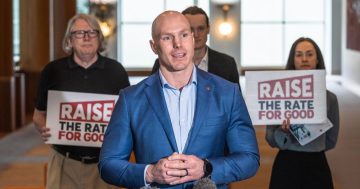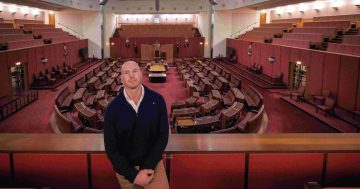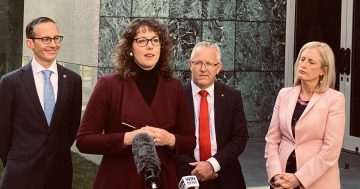
Senator David Pocock has urged the government to accept budget recommendations aimed at helping the poor survive. Photo: Michelle Kroll.
Ahead of the federal budget just two weeks away, an expert poverty group has urged the government to meaningfully lift Jobseeker payments, saying current levels are not keeping society’s most vulnerable people in life’s essentials.
The Economic Inclusion Advisory Committee has handed down a report with 22 recommendations across five priority areas outlining how the government can better help struggling Australians.
The advisory committee was established in November 2022 at the urging of ACT independent senator David Pocock and became permanent in December last year. Its purpose is to provide independent and non-binding advice to the government before every federal budget about tackling disadvantage.
Now, about a fortnight before each budget, the committee offers advice on policy settings, systems and structures, and the adequacy of income support payments. This year’s report is its second.
The first of its recommendations this year is to substantially increase Jobseeker and related working-age payments and improve the indexation arrangements for those payments.
“The current rates for the Jobseeker and related working age payments (including Youth Allowance, Austudy, ABSTUDY and Special Benefit) are too low,” the report states.
“Despite the $40 base rate increase delivered in last year’s federal budget, people receiving these payments told the committee that they regularly go without life’s essentials because they simply cannot afford them.
“This is, in part, the result of unsatisfactory indexation arrangements over many years.
“Without change to indexation arrangements, the living standards of recipients of these payments will continue to fall – whether measured relative to average or National Minimum Wages, pensions, or income poverty measures.”
The second recommendation is to increase the rate of Commonwealth Rent Assistance.
The committee’s report says that in recent decades, rental costs have exceeded household incomes for lower-income families and individuals.
It stresses that the composition of the rental market has also shifted from lower-cost public housing to the higher-cost private rental market.
“Over the past two years, many renters have experienced particularly high increases in private rental costs,” the report states.
“Continued strong rental growth in asking rents and actual rents is expected through 2024.
“Australians on income support payments often suffer from high rates of rental stress, with many finding their incomes heavily absorbed by rent, pushing them further into poverty or unsuitable and unsafe forms of accommodation.”
Anthony Albanese has flagged further cost-of-living relief in the budget.
The Prime Minister said in a recent speech that helping families will be a “front and centre of our thinking” in the budget.
On the release of this report, Senator Pocock said the government must put the needs of vulnerable people first in this year’s federal budget, and it should prioritise raising revenue from a fairer taxation system.
“What this expert committee has found is that we have a social safety net that is not keeping people safe,” Senator Pocock said.
“People reliant on income support payments won’t benefit from the tax cuts that the rest of us will receive.
“What the committee is challenging all of us to do is decide what kind of country we want Australia to be.
“The government talks a lot about not leaving anyone behind. This report, and especially the new Economic Inclusion Framework it proposes, gives them a blueprint to achieve this.
“Having our leaders saying we can’t afford to lift people out of poverty while they are still giving 50 per cent capital gains discounts to property investors and refusing to fairly tax companies making multi-billion dollar profits from exploiting our natural resources is unacceptable.
“When there isn’t a single rental property in a nationwide survey that’s considered affordable for someone on youth allowance, we know we are failing our young people.”
The other priority areas include creating a new employment services system to underpin the goal of full employment, implementing a national early childhood development system that is available to every child, and renewing the culture and practice of the social security system to support economic inclusion and wellbeing.
Original Article published by Chris Johnson on Riotact.









